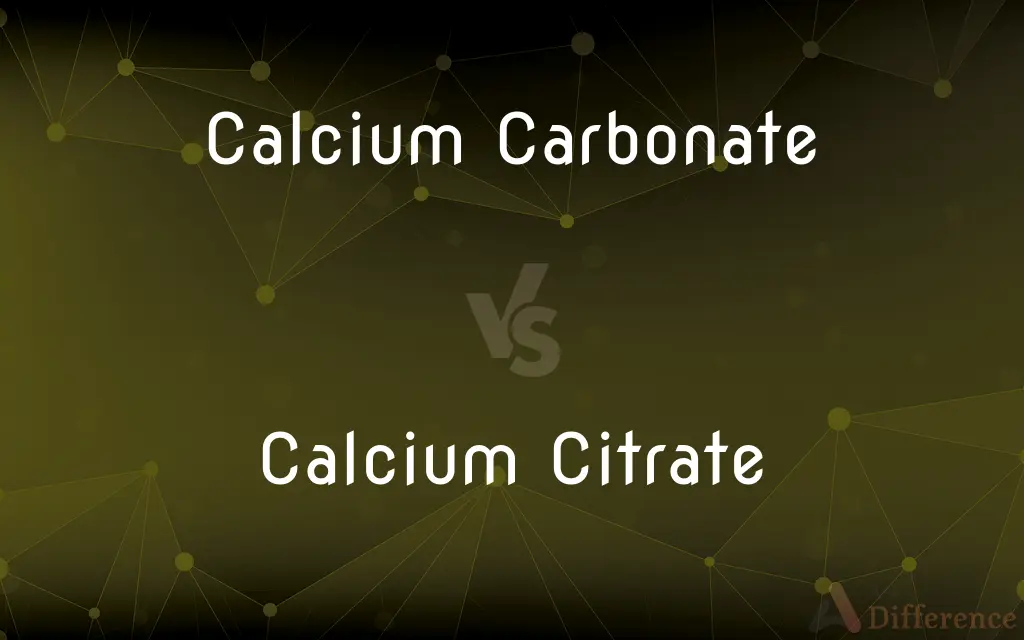Calcium Carbonate vs. Calcium Citrate — What's the Difference?
By Urooj Arif & Maham Liaqat — Published on March 30, 2024
Calcium Carbonate offers higher calcium content but requires stomach acid for absorption, while Calcium Citrate is more easily absorbed but contains less calcium, suitable for those with digestive issues.

Difference Between Calcium Carbonate and Calcium Citrate
Table of Contents
ADVERTISEMENT
Key Differences
Calcium Carbonate is a compound with a high percentage of calcium by weight, making it a preferred choice for calcium supplementation in terms of raw calcium content. It's cost-effective and widely used in over-the-counter supplements.
Calcium Citrate, on the other hand, contains less calcium by weight compared to Calcium Carbonate. However, its major advantage lies in its bioavailability, as it does not require stomach acid for absorption, making it ideal for individuals with lower stomach acid levels, such as the elderly or those on acid-reducing medications.
Calcium Carbonate is often taken with meals to ensure proper absorption, while Calcium Citrate can be taken without regard to meals, offering more flexibility for individuals with irregular eating schedules or specific dietary needs.
The choice between Calcium Carbonate and Calcium Citrate may also depend on individual tolerance, as Calcium Carbonate can sometimes cause gastrointestinal symptoms like gas and bloating in sensitive individuals. Calcium Citrate is often recommended for those who experience these side effects.
Both forms of calcium play crucial roles in bone health, and the decision between them should consider factors like dietary restrictions, age, health conditions, and personal preferences to ensure optimal absorption and effectiveness.
ADVERTISEMENT
Comparison Chart
Calcium Content
Higher (about 40% by weight)
Lower (about 21% by weight)
Absorption
Requires stomach acid for best absorption
Easily absorbed with or without stomach acid
Cost
Generally less expensive
More expensive
Ideal For
Those with no digestive issues
Individuals with low stomach acid or digestive issues
Usage
Best taken with meals
Can be taken with or without meals
Compare with Definitions
Calcium Carbonate
It's used as an antacid.
Calcium Carbonate effectively neutralizes stomach acid, providing relief from heartburn.
Calcium Citrate
Less likely to cause gastrointestinal issues.
Calcium Citrate is recommended for those who experience bloating from other calcium forms.
Calcium Carbonate
Requires stomach acid for absorption.
It's best to take Calcium Carbonate supplements with a meal to enhance absorption.
Calcium Citrate
Calcium Citrate is easily absorbed.
Calcium Citrate can be taken on an empty stomach without affecting absorption.
Calcium Carbonate
Calcium Carbonate is a primary source of dietary calcium.
A tablet of Calcium Carbonate can provide up to 40% elemental calcium.
Calcium Citrate
Suitable for individuals with low stomach acid.
Older adults often benefit from Calcium Citrate supplements.
Calcium Carbonate
Found in limestone and chalk.
Calcium Carbonate forms the white cliffs of Dover.
Calcium Citrate
Contains less calcium per dose.
More tablets of Calcium Citrate may be required to meet daily calcium needs.
Calcium Carbonate
Commonly used in supplements.
Many over-the-counter calcium pills contain Calcium Carbonate.
Calcium Citrate
Used in food as a preservative.
Calcium Citrate can act as a stabilizer and preservative in packaged foods.
Common Curiosities
How does stomach acid affect the absorption of these calcium supplements?
Calcium Carbonate requires stomach acid for absorption, while Calcium Citrate does not.
Can Calcium Carbonate cause side effects?
Yes, it can cause gastrointestinal issues like gas and bloating in some people.
What is the main difference between Calcium Carbonate and Calcium Citrate?
The main difference is in their calcium content and how easily they're absorbed by the body.
Can either form of calcium aid in weight loss?
While calcium plays a role in overall health, there's no direct link to significant weight loss with either supplement form.
Can I take Calcium Carbonate if I'm on acid-reducing medication?
It's better to opt for Calcium Citrate, as reduced stomach acid can affect the absorption of Calcium Carbonate.
Are there vegan sources of these calcium supplements?
Calcium Citrate is often preferred for vegan supplements, but always check the label for other ingredients.
Who should take Calcium Citrate over Calcium Carbonate?
Individuals with low stomach acid or digestive issues are better suited for Calcium Citrate.
Is there a difference in how Calcium Carbonate and Calcium Citrate should be taken?
Calcium Carbonate should be taken with meals, while Calcium Citrate can be taken with or without food.
Is Calcium Citrate more expensive than Calcium Carbonate?
Yes, Calcium Citrate is generally more expensive due to its enhanced absorption properties.
Can changes in diet replace the need for calcium supplements?
A diet rich in calcium can reduce or eliminate the need for supplements, but some individuals may still require them due to specific health conditions or dietary limitations.
Are there any dietary sources of Calcium Carbonate and Calcium Citrate?
Dietary sources usually don't specify forms, but dairy products are high in calcium, and fortified foods may contain either form.
Do I need a prescription to buy Calcium Carbonate or Calcium Citrate supplements?
No, both are available over-the-counter in pharmacies and health food stores.
How does age affect the choice between Calcium Carbonate and Calcium Citrate?
Older adults, who may have reduced stomach acid, might find Calcium Citrate a better option.
How do I know which form of calcium is right for me?
Consider factors like your digestive health, medication use, and dietary habits, and consult a healthcare provider.
Can taking too much calcium be harmful?
Yes, excessive calcium intake can lead to kidney stones and other health issues, so adhere to recommended doses.
Share Your Discovery

Previous Comparison
Pipe vs. Tube
Next Comparison
Test vs. TemptationAuthor Spotlight
Written by
Urooj ArifUrooj is a skilled content writer at Ask Difference, known for her exceptional ability to simplify complex topics into engaging and informative content. With a passion for research and a flair for clear, concise writing, she consistently delivers articles that resonate with our diverse audience.
Co-written by
Maham Liaqat













































